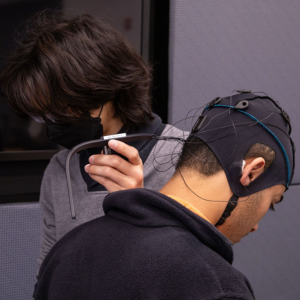The Johns Hopkins Undergraduate Brain-Computer Interface Society (JHUBCIS) is a
student-led interdisciplinary club dedicated to exploring the intersection of neuroscience,
engineering, and computer science. Daniel Wang, a junior majoring in Applied
Mathematics and Statistics, has served as the club’s president since Fall 2024. His
passion for brain-computer interfaces (BCIs) stems from his prior experience designing
assistive technologies for individuals with disabilities in high school. “BCIs are an exciting
opportunity to create unique technology that empowers people with disabilities to interact
with the world in new ways,” Daniel shared. His interests lie in neural decoding and
applying machine learning to interpret user intent from physiological signals—whether to
control a robotic vehicle or avatars in a virtual environment.
JHUBCIS’s mission is to provide undergraduates with educational and hands-on
experiences in BCI development, regardless of prior experience. The club hosts
workshops, tutorials, and in-depth projects that span hardware development, signal
processing, and machine learning. Through journal clubs and paper readings, members
gain exposure to the latest BCI research and applications, cultivating a strong foundation
in both theory and practice.
The club’s projects are as interdisciplinary as the field of BCIs itself. Recent initiatives
include combining EEG (electroencephalography) and EMG (electromyography) modalities
to control robotic systems. One recent project involved controlling two turtles in a virtual
environment: EMG signals enabled translational movement, while EEG allowed users to
switch between the turtles—achieving four degrees of freedom. This fusion of sensing and
control technology reflects the club’s focus on real-time, body-driven interfaces.
Engineering design principles are central to JHUBCIS’s approach. “It’s one thing to have an
idea and another to implement it,” Daniel explained. The team emphasizes iterative
prototyping—starting with low-fidelity models and minimum viable products, and gradually
building towards fully integrated systems. By first experimenting with individual
components (like EEG or EMG) and later combining them, members learn how to break
complex challenges into achievable steps.
Collaboration is a hallmark of the club, which draws students from diverse engineering
backgrounds. Electrical engineering majors set up sensors and interface with EEG
hardware; machine learning enthusiasts build models to decode physiological data; and
software engineers ensure smooth data transfer between systems, such as between a
neural model and a Raspberry Pi. Even mechanical engineering holds an integral role in
exploring how to refine machine effectors and enhance robotic interfaces.
JHUBCIS continues to be a hub for innovation and interdisciplinary learning at Hopkins.
The club welcomes all students interested in BCIs, whether they’re seeking to gain
technical skills or contribute to research-driven projects. Most communication occurs via
Discord, and students can sign up for email updates through HopkinsGroups. Stay
connected to learn about upcoming events, workshops, and project showcases.

